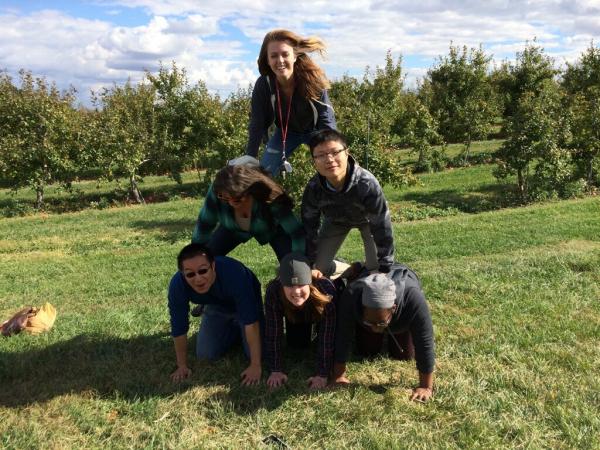小儿子到中部上大学,至今已有3个月了。这周末,他给我们打来电话,并告诉我们,他很喜欢大学的新生活,新环境,结交了不少新朋友,而且5门功课全是A。我们听后十分欣慰,想起小儿子的成长过程,真是充满了挫折和挑战… 可能因为我的妊娠糖尿病,控制不太好,小儿子出生后就很难带。夜间常常醒来,哭闹不止。那会儿,我正在攻读博士,学习和工作很忙,只好将奶奶从国内专程接来照顾他。一年后,奶奶离开了,我们只能将他送进幼儿园。他很不适应新环境,白天睡很长时间,晚上不愿睡觉,有时半夜还梦游,在房子里跑来跑去,大喊大叫。我们带他去看医生,做了各项检查后,医生告诉我们他的发育没有问题,可能是白天在幼儿园心情比较紧张,等长大后,他会慢慢变好的。 小儿子进入学前班,我们松了一口气,正想着为他设计美好的未来规划呢。没想在半学期的家长会上,我们的梦想,倾刻间从云端坠落。老师先发言,一一列举了小儿子在学校的坏表现:上课不听讲,独自坐在角落里或躺在地上,自己玩小玩具,在老师多次的提醒下,毫无改进。校长进一步说,他已到课堂观察多次,以为他是一个"trouble student" and not ready for school,并影响其他学生的学习热忱,他必须推迟一年再上学。经过考虑,我们只好让他又重读回到学前班。 小儿子进入小学后,刚开始时,学校安排他每周都要去3次Special Education. Mrs.Oldland 是一位和蔼可亲,年长的美国女教师,从事Special Education 几十年了, 非常耐心并且善长询询引导。那会儿,小儿子整天贪玩,心静不下来,Mrs. Oldland 根据小儿子的情况,给他专门制定了一套教学计划,慢慢让小儿子步入了正规。第二年小儿子终于跟上了大家的步伐,不再去Special Education,从格格不入的"异类"变成一个正常学生。 上初中时,学校要求每个学生选一种音乐爱好,小儿子选择吹小号。他总算找到了自己的兴趣和爱好,每天晩上都认真练习,从中也增加了他的自信。他的各门成绩有明显的提高,以较理想的成绩从初中顺利毕业。 因为我先生的工作调动,我们一家从明尼苏达州搬到了加州湾区。经过一番调查,我们在著名的Mission San Jose 学区买了一幢小屋,小儿子进入了Mission San Jose High School 读高中,这所高中在湾区的公立高中排名,名列前矛,亚裔比例超过90%。一进校,小儿子就感到学习压力很大,课程和要求都比Minnesota 高,他感到力不从心,成绩不太好。记得高中二年级,他学Honor Chemistry 时,每天作业多,小考不断,他的成绩很糟糕。小儿子有点自暴自弃,我们一直蒙在鼓里,直到收到学校的信后,才知他巳经远远落后了。我和我先生单独约见了化学老师,在15分钟的交谈中,化学老师给我们看了他的作业与考试卷子,对他的学习态度和能力十分失望。只记得那天,天很冷,一直冷得心底,在开车回家的路上,我们默默无语。那天晚上回家后,我们花了很长时间与小儿子对话,让他自己先分析原因和制定新的学习计划,鼓励他面对挫折,重新找回自己。 进入高中三年级,小儿子猛然惊醒,悄然中,高中生活已过了一半。他突然开始了反思,我真的不如别人聪明吗?他好像换了一个人,每天下午一回到家,马上开始做作业,很快他的各门成绩大幅上涨。他第一次感到,努力学习也会带来另一种快乐。从此,他开始刻苦学习,第一次所有课程全部得到了A。小儿子终于成长了。高中的最后一年,小儿子凭着坚韧的毅力,建立起积极的学习态度,终于走出了谷底,获得了自信,水平飞跃并享受到学习的乐趣,SAT 也考取了理想的成绩。小儿子用真情实感将自己高中的经历,写进了申请大学的Essay,最后他一共收到了9 所大学的录取,并得到了奖学金,经过仔细考虑后,他选择了最适合自己的一所大学,开启人生新的一页。小儿子励志的故事,让我们一起成长,以阳光的心态面对人生中遇到的困境,那么,明天便是一片睛天… 小儿子写的申请大学Essay: As I shifted towards my new life at Mission, I had no idea what I was going to encounter. Having lived in Maryland for my entire life, I felt fearful that I wouldn’t be able to assimilate into my new environment. The environmental pressure of moving from a mediocre school to one nationally recognized only added to the pressure I was already facing from changing states. After just the first day, I felt as though I had lost my high status among my peers. I recall being so thrilled to be able to show off my abilities as a viola player that I offered to play the solo on one of the pieces we were working on. But within minutes, I realized that the orchestra here was at a much higher level; the dynamics, intonations, and tone made for a flawless presentation. When it was my turn to play the solo, I couldn’t get myself to play. I could feel the puzzled stares from every corner of the room burning into my body. The teacher lectured me in front of the class for what seemed like hours as beads of sweat formed throughout my body. The first two years of high school continued on in a similar fashion. The classes I took only reaffirmed the sense of higher expectations. The low point of my struggle occurred in my sophomore year Algebra 2 class. I felt overwhelmed by the teacher’s words of discouragement, the jokes my peers made about me failing high school, and the consistently low test grades. I quickly lost interest in the subject as these pressures mounted and started to feel as though my efforts were fruitless. Despite my inability to match my peers and deal with a competitive and discouraging environment, there was something beyond the failure to do well academically; I had shied away from adversity and allowed those around me as well as my competitive mindset impede my success. My optimism kept me focused and motivated in the face of failure. While making up the course I had struggled with was satisfying, I strived for more than just vindication: I wanted to improve my mindset. I read articles about psychology in the summer to facilitate this improvement and soon enough, I came across something novel. There were two types of mindsets highlighted: the fixed mindset and the growth mindset. The fixed mindset highlighted the idea that all our abilities were set and could not be changed while the growth mindset highlighted the idea that our abilities could be developed. The fixed mindset often leads to a tendency to avoid challenges for reasons such as a desire to appear smart and seeing efforts as useless. I was disgusted by how much this had characterized me. Every day, I made a checklist of sources that were inhibiting me from embracing challenges and made sure that I conquered them. I practiced study strategies to help set myself over the edge. This experience helped me improve in many aspects: my grades improved dramatically, my confidence rose, and most importantly, every effort I made seemed to be full of payback. By the end of my Junior year, I had crafted myself into a confident and determined person ready to tackle any challenge and overcome any failure that layahead. While my peers saw my academic improvement as the most important aspect of my success, I looked at the academic improvement as a fortunate by-product of the much greater accomplishment of improving my outlook. My experience had done far more than just prepare me for academic success. It had helped me realize the importance of acknowledging our limitations, not letting the influence of others impede my success, overcoming failure, and dealing with failure. The song started. The drums were beating. It was my time to shine. As the conductor cued the solo, my heart was pumping at a rapid pace. All eyes were fixed on me, expecting perfection. I embraced my role with nothing short of my full confidence. I nailed it. 
|
